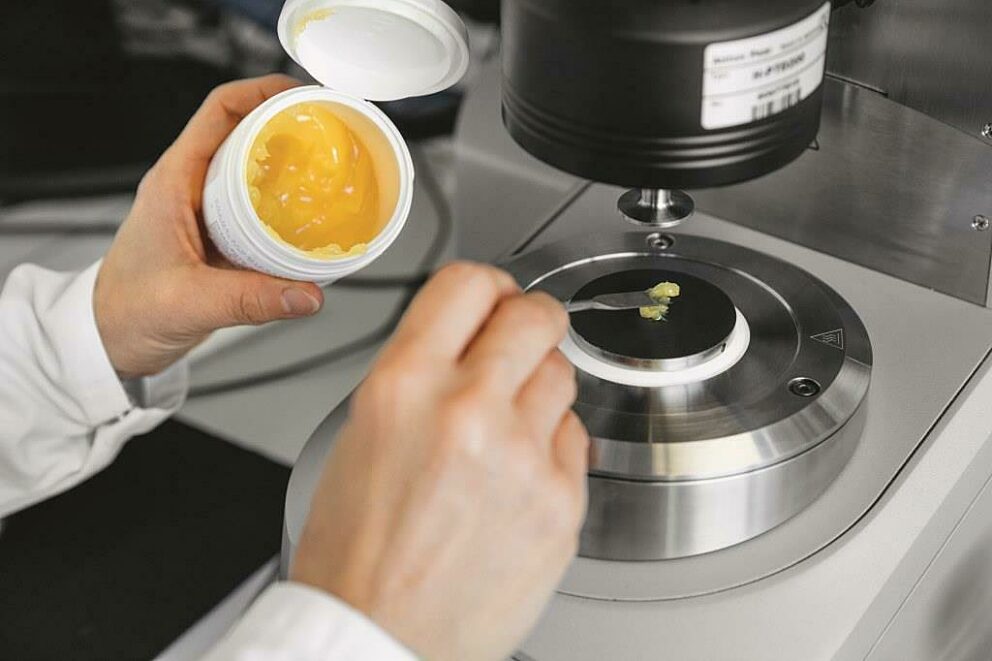PHAt becomes PHAtiCuS — Research and development of environmentally compatible lubricants enters the next phase

Around 700 thousand tons of lubricants were delivered in Germany last year. These possibly every day and partly highly specialized aids are used wherever machines of all kinds literally have to run smoothly and have to be protected from excessive wear and from corrosion. As indispensable as they are in many areas, many lubricants are also not entirely harmless due to their chemical composition. Lubricants and bonded coatings are largely petroleum-based, and their production and disposal must therefore be scrutinized from a contemporary sustainability perspective. Despite the technical level now reached by bio-lubricants, there are still considerable challenges here, particularly regarding the CO2 footprint and product costs.
The project “PHAt — Polyhydroxyalkanoates as thickeners and binders in technical lubricants” marked the end of a three-and-a-half-year, 1.25-million-euro cooperation funded by the German Federal Ministry of Education and Research between the Fraunhofer Institute for Environmental, Safety and Energy Technology UMSICHT, Fritzmeier Umwelttechnik GmbH & Co. KG, UnaveraChemLab GmbH and FUCHS SCHMIERSTOFFE GmbH with FUCHS LUBRITECH GmbH. With a distributed remit, the project partners devoted themselves to the development of innovative thickeners and binders based on biotechnologically produced polyhydroxyalkanoates (PHA).
The ambitious project was initiated within the framework of the “BioPlastics” cooperation network led by Industrielle Biotechnologie Bayern Netzwerk GmbH (IBB Netzwerk GmbH), in which participants meet twice a year for a productive exchange of ideas and share their know-how in joint projects.
Project coordination, under the direction of Dr. Inna Bretz, was the responsibility of Fraunhofer UMSICHT, which also contributed the preliminary studies on PHA-based thickeners and binders on a laboratory scale. The biotechnological PHA production was carried out by the medium-sized company Fritzmeier Umwelttechnik GmbH & Co. KG, while the subsequent chemical PHA modification was the core competence of UnaveraChemLab GmbH. Finally, the practical expertise for application-oriented testing of the new developments was provided by FUCHS.
Project goal achieved
After a total of three and a half years, all those involved can look back positively on what has already been achieved. What counts above all is the direct comparison of the goals set for themselves with the verifiable results. The task was to use PHA as a thickener in a preferably biological lubricant (EN16807 or 2011/381/EU), to develop PHA-based thickener systems for consistent lubricants and to use PHA as a binder for polymer-based bonded coatings. The properties of the innovative additives should be at least equivalent to those of conventional thickeners.
Process and results
The project began with the precise definition of the technical properties relevant to lubricants as a whole, which were therefore also to be fulfilled by new PHA-based products. This was followed by initial basic tests of the compatibility of PHA with conventional base oils, which made it possible to assess elementary challenges and quickly made it clear that this very compatibility was not sufficiently given and that a chemical modification of PHA was necessary.
Both in the area of the use of PHA in bonded coatings and in the combination of modified PHA with certain base oils, promising results were achieved with regard to compatibility and the desired thickening effect.
The way forward
At the same time, it became clear at the end of the project that the overall goal is within reach. But further research is still needed to develop bio-based polymers in lubricants and bonded coatings into marketable and competitive products.
Accordingly, the focus is now turning towards the future and the follow-up project. The continuation of “PHAt” bears the name “PHAtiCuS” and is planned to run for three years until the end of March 2024.
Source
IBB Netzwerk GmbH / PHAtiCuS-Konsortium